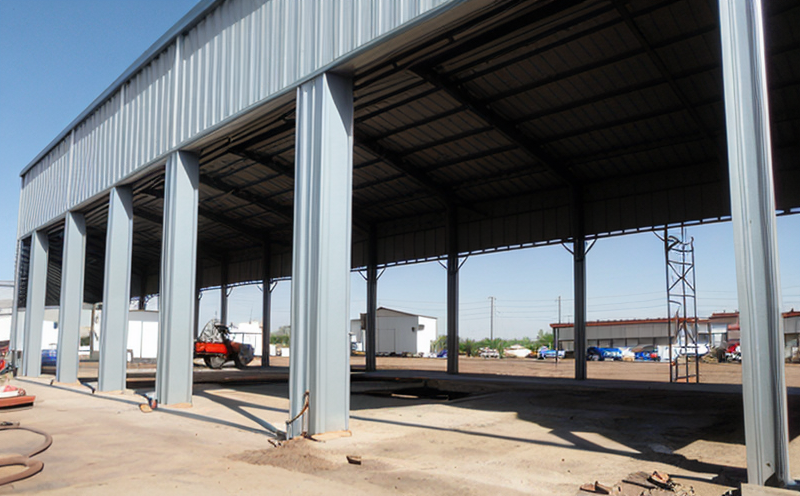EN 10002 Steel Strength at High Temperature
The EN 10002 standard is a critical part of structural steel testing, particularly in sectors where high-temperature applications are common. This standard provides procedures for determining the mechanical properties of steels and welds at elevated temperatures.
High-strength steel structures are used extensively in various industries including construction, aerospace, and automotive. These structures must be able to withstand extreme conditions without compromising safety or performance. The EN 10002 standard ensures that materials meet the necessary requirements for these applications by providing a standardized method of testing.
The test involves subjecting a specimen cut from structural steel to a specified temperature and holding it there for a given duration before performing tensile tests. This allows engineers to determine how well the material will perform under high-temperature conditions, which is essential for designing safe and reliable structures in challenging environments.
Understanding the behavior of materials at elevated temperatures is crucial because many structural failures occur due to overestimation or misinterpretation of these properties. By adhering to EN 10002, laboratories can provide accurate data that supports informed decision-making processes within their respective industries.
The importance of this test cannot be overstated given the potential risks associated with improperly designed or manufactured structural components operating at high temperatures. Compliance with relevant standards like EN 10002 helps ensure product quality and safety, thereby protecting both personnel and infrastructure from potential hazards.
Furthermore, results from these tests play a vital role in validating design assumptions made during the development phase of new products or projects involving complex geometries and materials. For instance, architects designing skyscrapers equipped with large glass facades might need to consider how those elements would behave under extreme heat conditions, especially if they are exposed directly to sunlight throughout much of the day.
It is also worth noting that while many other standards exist for evaluating steel properties at room temperature or low temperatures, few specifically address high-temperature scenarios. Therefore, compliance with EN 10002 can serve as a valuable benchmark when comparing materials across different projects or suppliers.
In summary, the EN 10002 standard represents an important tool for ensuring structural integrity in environments where elevated temperatures are present. It enables accurate assessment of material performance through precise testing methods and provides critical insights into how best to design safe and durable structures capable of withstanding such conditions.
Why It Matters
The EN 10002 standard is significant because it addresses a specific gap in the evaluation of structural steel properties that other standards do not fully cover. High-temperature tests are particularly relevant for applications where components may experience prolonged exposure to heat, such as in power plants, offshore platforms, or aircraft fuselages.
- Enhances Safety: Ensuring materials can withstand high temperatures reduces the risk of catastrophic failures that could lead to loss of life or property damage.
- Promotes Reliability: By validating material performance under extreme conditions, EN 10002 helps guarantee consistent quality across different manufacturing batches and suppliers.
- Sustains Durability: Understanding how steel behaves at elevated temperatures allows for better long-term planning of infrastructure projects that will be subjected to harsh operating environments.
The importance of this standard extends beyond mere compliance; it plays a pivotal role in advancing technology and innovation by providing reliable data upon which further developments can build. For instance, advancements in lightweight alloys often require thorough testing at high temperatures to ensure they meet the necessary performance criteria without sacrificing strength or stability.
Eurolab Advantages
At Eurolab, we pride ourselves on offering comprehensive and reliable EN 10002 testing services for structural steels. Our state-of-the-art facilities and experienced technicians ensure that every test conducted meets the highest industry standards.
- Precision Instruments: We utilize cutting-edge equipment to perform precise tensile tests at high temperatures, guaranteeing accurate results.
- Experienced Technicians: Our team comprises highly skilled professionals with extensive experience in structural steel testing who understand the nuances of EN 10002.
- Detailed Reporting: Every test is accompanied by detailed reports that provide comprehensive analysis and recommendations based on the findings.
We offer a range of services tailored to meet your specific needs, whether you require one-off tests or ongoing support for complex projects involving high-temperature applications. Our commitment to excellence ensures that our clients receive accurate and timely results, enabling them to make informed decisions confidently.
International Acceptance and Recognition
- The EN 10002 standard is widely accepted in Europe but also recognized globally for its rigorous approach to evaluating structural steel properties at high temperatures.
- Many countries have adopted this standard as a benchmark for assessing materials intended for use in extreme environments, ensuring uniformity across international borders.
- Compliance with EN 10002 is often required by regulatory bodies when approving new products or projects that involve high-temperature applications.
This widespread acceptance underscores the importance of this standard within the global construction and manufacturing industries. It serves as a trusted reference point for ensuring consistent quality and safety across different regions, fostering international collaboration on critical infrastructure projects.





